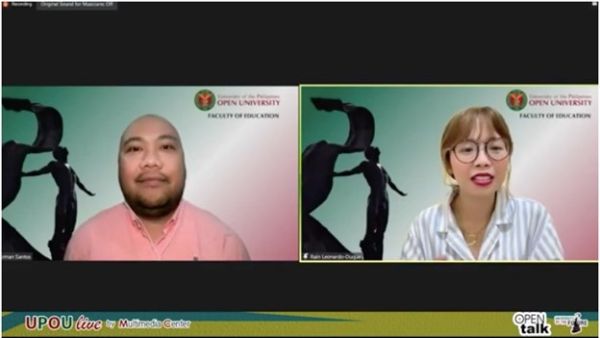
Dr. Arman DC. Santos (left) and Assoc. Prof. Rainilyn Leonardo-Duque (right) tackled the nature and misconceptions of dyscalculia in the 28th episode of OPEN Talk.
OPEN Talk tackled dyscalculia, a form of learning disorder, in the episode titled “Dyscalculia? Ano yon?” on 16 November 2022 from 4:00 pm to 5:00 pm via the UPOU Networks website and Facebook page.
The resource person for this episode was Dr. Arman DC. Santos, a PhD in Education graduate from the Faculty of Education (FEd) of the University of the Philippines Open University (UPOU). He is currently an Associate Professor from the College of Education of the Polytechnic University of the Philippines (PUP), Sta Mesa Campus, and a Campus Director of PUP-Pulilan Campus. The moderator of the discussion was Assoc. Prof. Rainilyn Leonardo-Duque, a PhD in Education graduating student also from FEd, UPOU. She is currently the Head of the Mathematics Department of the College of Science of Bulacan State University.
Dr. Santos clarified that dyscalculia is a specific learning disorder with impairments in the academic domain of mathematics. He identified the four diagnostic criteria of the disorder, namely, the difficulty in using the academic skills in mathematics is persistent, impairments and deficits in mathematics are quantifiable, challenges in mathematics should begin during the school-aged years, and difficulty in mathematics is not accounted to intellectual disabilities.
The resource person provided some common signs and symptoms of the disability, which are important in identifying if a person, especially a child, has dyscalculia — difficulty in counting during the earlier years; difficulty in performing basic arithmetic operations, such as needing to use the fingers in performing basic addition; avoidance or fear of numbers; anxiety towards the mathematics subject; and difficulty in dealing with the sense of time and giving directions.
He mentioned that there is no definite answer yet as to the cause of dyscalculia, but some studies show that it is innate and that the person possesses the disorder since childhood. “Since the learning condition starts from childhood, it can be carried through adulthood, thereby affecting the person’s life, especially that mathematics is everywhere and part of our daily living,” he said.
The resource person clarified some misconceptions involving dyscalculia. “We need to remove the mentality that a person with dyscalculia has low IQ; it’s possible for a child to have normal IQ but has a very low performance in mathematics,” he said. He claimed that the difficulties experienced by people who have dyscalculia should not be accounted to the intellectual disabilities because other factors could cause such limitations, such as eyesight problems. He explained that having difficulties in mathematics does not necessarily mean having dyscalculia because other factors can cause an individual to have challenges with mathematics.
Dr. Santos shared that dyscalculia can be managed with the right intervention, such as using assistive devices, adopting technological resources, and providing individualized instruction. He believed that mathematics educators and psychologists can collaborate to design instruments that can detect early signs, symptoms, and tendencies of dyscalculia. He recommended consulting with a neurodevelopmental professional, pediatrician, and child psychologist for checkup and diagnosis on the learning disability.
The 28th episode of OPEN Talk is a collaborative undertaking between Multimedia Center and UPOU Faculty of Education’s EDUKussion. It can be viewed on UPOU Networks website and UPOU Networks – Multimedia Center Facebook page.
Written by Jaime Guimbao
Edited by Myra C. Almodiel and Anna Cañas-Llamas








